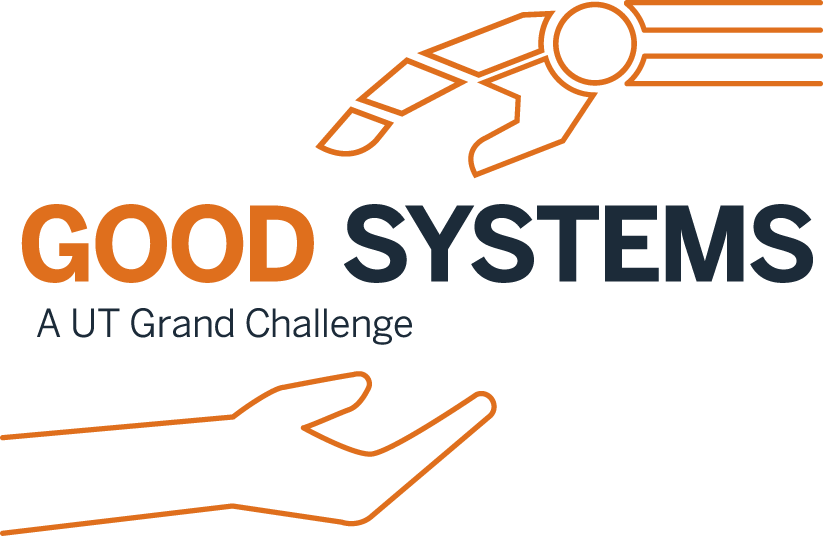Good Systems
The Technology and Information Policy Institute is a participant in Good Systems research for two projects, Ethical Data Design and Disinformation.
Ethics, Values, and A.I.
“Technology is neither good nor bad; nor is it neutral.” This is the first law of technology, outlined by historian Melvin Kranzberg in 1985. It means that Technology is only good or bad if we perceive it to be that way based on our own value system. At the same time, because the people who design technology value some things more or less than others, their values influence their designs.
We use that technology — and, increasingly, artificial intelligence — to entertain us, communicate, get places faster, make predictions, swipe left or right, protect our homes, solve complex problems quickly and easily. In short, A.I. is changing the way we do everything because it’s everywhere — from dating apps to the most advanced military technology.
But because technology is never neutral, it has the capacity to be harmful to us in ways we might not intend or predict. The difficulty for us, as scientists and engineers, is that A.I. is helpful.
It can do many things faster, better, and easier than humans, and humans reap the rewards. But how will A.I. affect society, work, and how we interact with others? We need to answer these questions proactively rather than waiting for bad things to happen and reacting after it’s already too late.
In the words of Michael Crichton’s “Jurassic Park” mathematician, “Your scientists were so preoccupied with whether or not they could, they didn’t stop to think about if they should.”
CAN WE ENSURE THAT A.I. PROTECTS HUMANITY, NOT DESTROYS IT?
That’s the question we have to ask now: Should we? How can we ensure that advances to A.I. are beneficial to humanity, not detrimental? How can we develop technology that makes life better for all of us, not just some? What unintended consequences are we overlooking or ignoring by developing technology that has the power to be manipulated and misused, from undermining elections to exacerbating racial inequality?
Our goal is to provide a way for prosocial values to drive the design of artificial intelligence in autonomous and semi-autonomous technologies so that those systems both protect and improve society.
Technology is neither good nor bad; nor is it neutral.
Research Strategy
Introducing Bridging Barriers during his State of the University Address in 2016, President Fenves stated, “The toughest questions facing humanity and the world cross the boundaries of existing knowledge, and we must take a convergence approach to address them . . . Breakthroughs happen when we break down silos of knowledge. And we are doing that now.” Good Systems aims to embody this approach by bringing about a true convergence of disciplinary perspectives, one that is both symbiotic and synergistic. Connecting our disciplines into new networks, we aim to achieve a new intensity of symbiosis across the University, as each of our disciplinary perspectives benefits from insights from other disciplines.
Phase 1 Goal
The goal of Good Systems in Phase I will be to conduct basic research on how to define, evaluate, and build good systems. Experts from a wide range of fields, including humanists, social scientists, and technologists, are needed to achieve convergent research. While other initiatives around the world are beginning to explore the ethical implications of AI, UT’s Good Systems is distinctive with respect to the wide range of fields engaged and the degree to which these fields converge via mutual respect and understanding.

What’s New
Good Systems, A UT Grand Challenge: Designing values-driven AI technologies
How can we ensure that AI is beneficial - not detrimental - to humanity? How can we develop technology that makes life better for all of us, not just some? What unintended consequences are we overlooking or ignoring by developing technology that has the power to be...
Regulation and Responsibility: The Dynamic Global Landscape for Privacy, Data Protection, and Technology
2019-03-11, 11 a.m., Engineering Education and Research Center Mulva Auditorium Good Systems is hosting a fireside chat with Julie Brill, Microsoft's Corporate Vice President and Deputy General Counsel, and Professor Sharon Strover from the Moody College of...
TIPI Presents at Information Wars: Social Media and Politics in Russia & Eastern Europe Symposium
This symposium encouraged a fruitful conversation about the role and impact of mainstream and social media—and in particular about information and disinformation wars—in political battles, trajectories, and outcomes in Russia and Eastern Europe. Speakers discussed the ways in which these processes and networks have had global impacts, such as in the 2016 US elections and beyond.


